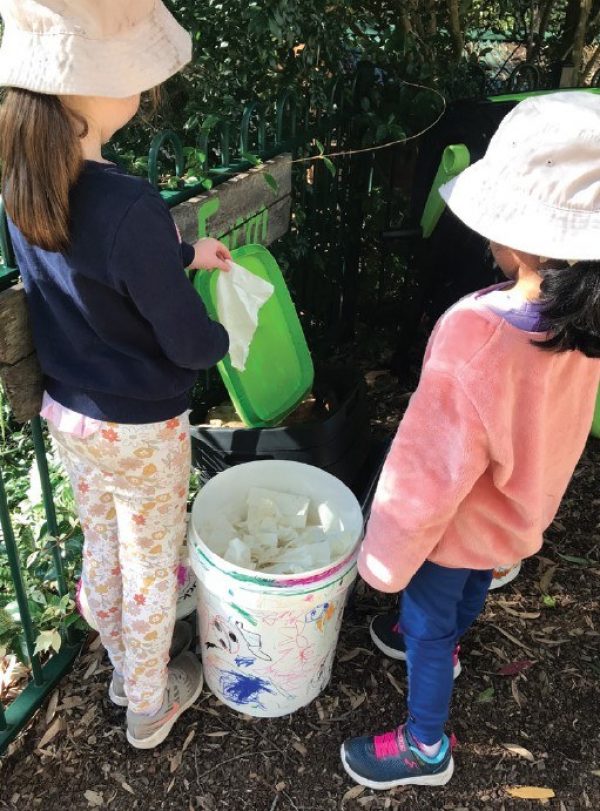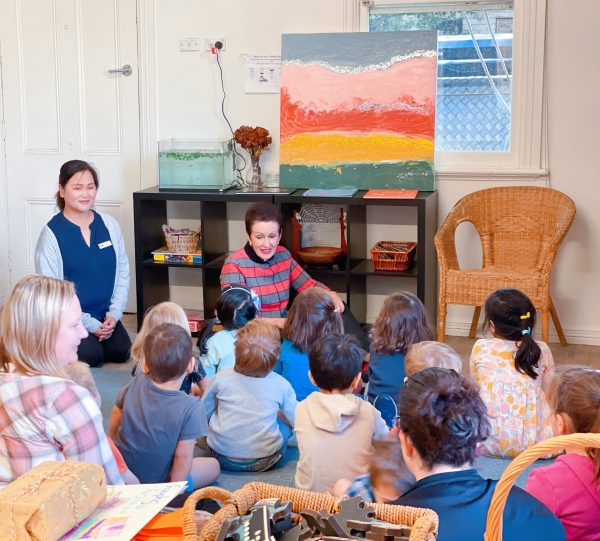For the past three years, KU’s number one strategic priority has been to deliver, lead and inspire educational excellence. Here are three ways our services delivered educational excellence through innovative programs in 2022.
Sustainability: Recycling paper hand towels
Beginning in early 2022, eight KU early education services in Sydney’s Northern Suburbs undertook a project to discover how to responsibly manage waste from paper towels and reduce impact on landfill.
A connection was made with Plate to Paddock, an organisation working with businesses to minimise waste. Where waste cannot be avoided, rather than see it being sent to landfill, they assist with either managing it on site, or by redirecting it to charities or farms. They can even transform all kinds of organic waste into healthy soil.
This project started with inspiring talks by Elisabeth, the founder of Plate to Paddock, who visited each of the seven preschools and one long day care service involved.
“The ripple effect extended to spontaneous learning and lots of discussions and ideas about how we can care for country more,” says Sam, an educator at KU St Ives Barra Brui Preschool.
The first task required gaining an understanding of how much paper towel waste was being created.
An audit conducted by teams of children in each service revealed that on average the preschools used 1,200 paper towels each week, while the long day care service used an estimated 4,000 per week. Added up over a year, it represented a significant number.
From there, the children put a system in place to collect the waste.
The Sanitarium Health and Wellbeing Company kindly donated recycled food buckets that were decorated by the children at each KU service specifically for the collection of used paper towels.
Each week, Plate to Paddock transported the waste to their property where it would be broken down in worm farms to create healthy soils – a process that the children found intriguing.
“One child told me, ‘The worms eat everything including the dirty paper towel. They are super worms’,” says Holly, educator at KU Fox Valley Preschool.
“Overall, the children have shown an increased awareness of their usage of paper towels and continue to work towards lowering it”, she says.
Arts and creativity: Clay work
Maryjane Minshull, Director at KU Peter Pan La Perouse Preschool in Sydney’s east, organised an artist in residence program supported by a Quality Learning Environment Grant from the NSW Department of Education.
The preschool worked with Jan Downes, a well-respected teacher and ceramic artist who has been practicing for over 30 years. Jan offered the education team at KU Peter Pan La Perouse a unique opportunity to be co-learners alongside children.
After taking two months to prepare and set up a studio inside the service and install a kiln in an outside shed, educators began to develop skills, techniques, and creativity as they explored ceramics as an integral part of the curriculum.
The team worked together to investigate the potential of clay as a rich medium for children. Workshops were attended during weekends to grow a sound understanding of the care and maintenance of clay, the design of the environment to set the stage for learning, and the many techniques and tools that would give children confidence to engage successfully with clay making.
The children and educators together developed a repertoire of knowledge that included the different types of clay, how to make slabs, coils and slurry, joining methods, printing methods, the use and preparation of glazes and underglaze, firing methods as well as processes for recycling clay.
The technical problem-solving that is required for complex clay pieces provides stimulating and creative challenges for children as Jan detailed in an interview with The Journal of Australian Ceramics.
“A ball of clay in the hands of a young child invites intuitive exploration. Children love the tactility, immediacy, malleability and responsiveness,” she says.
“Manipulating clay allows children to express themselves and represent the real, three-dimensional world as they experience it,” says Jan.
The team recognised that through clay, children had another language for expressing their thoughts, ideas, and emerging working theories about their world.
Community connection: Children’s agency
In Sydney’s inner-city, the team at KU Ultimo Children’s Centre has a strong commitment to children’s agency and participation in and with the community, as Director Jenny Liu explains.
“Aspirations to introduce the concept of citizenship as part of their belonging to the centre community and cultural identity of the wider local community has informed many pedagogical discussions and experiences in 2022,” she says.
For instance, educators at the service developed a Precipitation Project, which led to reaching out to communities affected by floods early in the year.
The preschool children showed an appreciation for the collective efforts of the local community, and how this can make big a change in the lives of others.
Then there were regular excursions to historic Fig Lane Park where the children had an opportunity to learn about their neighbourhood.
The team also invited visitors to the service so they could give the children a broad exposure to all the different roles within the community.
“We invited the local police and Pyrmont firefighters to the service so we could learn about how community members can keep each other safe,” says Jenny.
“We also had visits from an architect, doctor, clinical psychologist, chef, teacher, editor and more. These visits influenced the children to decide to write to the leader of our community, to share their knowledge about what they had learned,” she says.
The leader was none other than Lord Mayor of the City of Sydney, Councillor Clover Moore, and the children not only sent a card with drawings, but they also invited the mayor to visit the service.
“We were very grateful to get a response from the Office of the Lord Mayor and in early December she visited the children, listening to their ideas and answering their questions about what she does in the community,” says Jenny.



